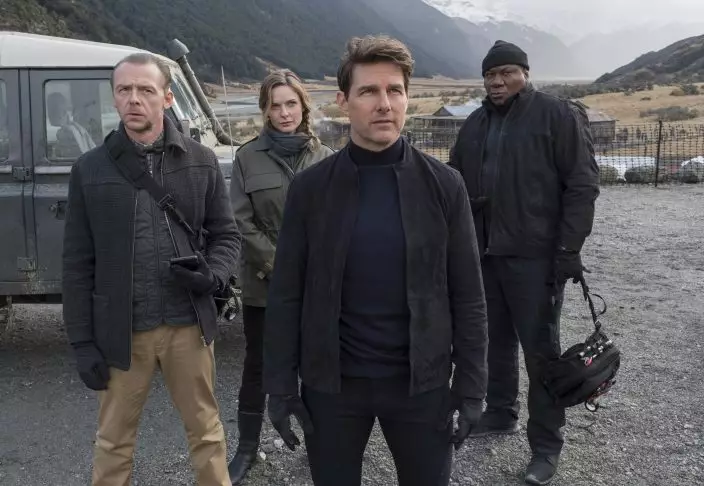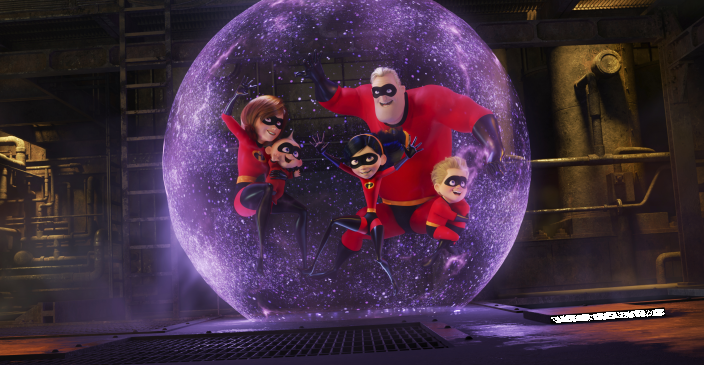Have you noticed something oddly tranquil about this summer movie season? For the first time in recent memory, there hasn't been one major bomb.
Usually by now, there would be blockbuster-sized craters left on the charred summer-movie battlefield, the inevitable toll of Hollywood's most high-stakes season. But this year, summer-movie bomb-watching, long one of the most dependable spectator sports of the season, has gone entirely without the sight of a "Lone Ranger"-sized mushroom cloud.
After the cataclysmic, the-sky-is-falling summer of 2017, when overall grosses slid 14.6 percent from the year before, Hollywood has rebounded. Ticket sales in North America this summer are up 11.3 percent, according to comScore. The comeback is even more pronounced when you factor in that the annual Marvel movie kickoff to summer slid just ahead of the official first weekend of May start, shifting the $678.5 million domestic for Disney's "Avenger: Infinity War" to the spring.

This image released by Paramount Pictures shows, from left, Simon Pegg, Rebecca Ferguson, Tom Cruise and Ving Rhames in a scene from "Mission: Impossible - Fallout." (David JamesParamount Pictures and Skydance via AP)
Amid a remarkably turbulent time for the movie business, this summer has been surprisingly, almost weirdly, steady.
"The studios did what they were supposed to," said Kyle Davies, domestic distribution chief for Paramount Pictures. "This notion that people are tired of going to the theaters, I don't believe it for a second. I think people are ready every weekend: 'Give me a reason to come.'"
Paramount didn't have a lot of releases over the summer but coming off the spring success of "A Quiet Place," Davies said, "Things have turned around." ''Mission: Impossible — Fallout," the sixth installment in the Tom Cruise franchise, is approaching $500 million worldwide, and the Diane Keaton-Jane Fonda-starring "Book Club" has, with $68.6 million, fared better than most comedies this year.

This image released by Focus Features shows Fred Rogers on the set of his show "Mr. Rogers Neighborhood" from the film, "Won't You Be My Neighbor." (Jim JudkisFocus Features via AP)
But even Tom Cruise, despite all his powers, can do only so much to tip the overall box office. So what's behind the bounce back?
MoviePass, the flailing subscription service, has claimed responsibility. Subscription moviegoing has surely had an additive effect, bringing more regular visitors to theaters. But how much? There's no statistical evidence of MoviePass boosting bottom lines, and studio executives downplay its influence as minimal. ("Mission: Impossible," for one, wasn't available on MoviePass.) MoviePass, which this week reduced its plan to three movies a month, says it accounts for 6 percent of all domestic tickets.
Mid-summer, AMC trotted out its own $20-a-month subscription option, attracting 260,000 subscribers in its first seven weeks. AMC on Thursday said that's translated to about 1 million admissions or about 4 percent of U.S. moviegoers at AMC theaters, the country's largest chain.
Jeff Bock, senior box-office analyst for Exhibitor Relations, said it's difficult to extrapolate how big a driver subscription services have been, though he credited the copious attention and drama around MoviePass with fueling moviegoing awareness. He's more inclined to point to the improved studio project, specifically sequels like "Incredibles 2," ''Ant-Man and the Wasp" and "Deadpool 2."
"The one thing that was very different from last year's sequels is that people wanted to see these. That's what it comes down to," said Bock. "You can say Hollywood's running on good credit and that's probably one of the reasons people are coming out weekend after weekend."
The difference in Pixar releases alone accounts for a yawning $440 million gap. Last summer, the little-loved "Cars 3" grossed $152.9 million domestically; this year, "Incredibles 2," the summer's biggest smash, has earned $590.3 million in North America.
The season hasn't been without its worrisome blips. Two of the most dependable forces in moviegoing — "Star Wars" and the Rock — both showed that they're mortal. But even those disappointments were measured. "Solo," while cause for real concern for "Star Wars" going forward, still nearly cleared $400 million worldwide. Dwayne Johnson's "Skyscraper," saved by sales in China, managed to gross almost $300 million worldwide.
But the final two weeks of August should only pad the season's lead. After scoring $5 million in its opening day Wednesday, Warner Bros.' "Crazy Rich Asians" — hailed as a watershed moment for Asian-American representation in mainstream moviemaking — appears poised to ride glowing reviews to approximately a five-day $25 million debut. Following last weekend's chart-topping "The Meg," a shark thriller, Warner Bros. will likely account for the summer's only two original, non-sequel no. 1 releases.
"It's content. When you look at last year, there wasn't much beside "Wonder Woman" and "Dunkirk" that really clicked," said Jeff Goldstein, Warner Bros.' distribution head. "When we've had dips, it's when the movies haven't delivered."
On the indie side, business has been slower, though A24 notched its highest grossing release with Ari Aster's acclaimed horror film "Hereditary" ($79.3 million worldwide). Spike Lee's recently released "BlacKkKlansman," for Focus Features, has added a jolt to the often sleepy August period, landing the director his best opening weekend in 12 years.
But the most unexpected sensations of the summer have been documentaries. There will be three docs to clear $10 million in box office, an unprecedented high for non-fiction filmmaking. "Won't You Be My Neighbor" is up to $21.8 million for Focus, Neon's "Three Identical Strangers" has hauled in $9.7 million, and Magnolia's Ruth Bader Ginsberg documentary "RBG" has grossed $13.7 million.
"It's a zeitgeist moment, no doubt," said David Linde, chief executive of Participant Media, which co-produced "RBG." ''People go to the theater for a unique experience and that experience is all about a collective experience. That hasn't ever been truer."
Follow AP Film Writer Jake Coyle on Twitter at: http://twitter.com/jakecoyleAP











